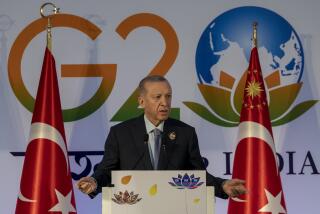A Pro-Islamic Regime in Turkey : Western ties should remain strong, despite shift in government
- Share via
Bulwark of the eastern Mediterranean, successor to the Ottoman Empire, anchor of NATO, Turkey almost always has moved slowly but steadily, and did again last week in adopting a professedly pro-Islamic government, the first since Kemal Ataturk proclaimed Turkey a secular nationalist republic in 1923. So expect no sudden changes. There will be no move to align Turkey with what former Prime Minister, now Foreign Minister, Tansu Ciller calls the “dark forces” of Islamic politics, meaning Muslim leaders who would bring religious law to a secular society.
The new prime minister, Necmettin Erbakan, while espousing religious values, seems at least as interested in currying populist favor. One of his first acts was to declare a 50% pay raise for civil servants and pensioners, and Turkey’s soldiers, sailors and airmen will get more than that.
Turkey has felt the Islamic winds from the east before, and twice in recent decades the army has seized power, but the governments in Ankara have played their cards well. They built a bridge to the West by joining NATO in 1952 and the European Customs Union last January, with the eventual goal of becoming a member of the European Union. When Washington sought the right to use NATO air bases in Turkey to fly missions over northern Iraq at the end of the Gulf War, Ankara delivered. Even Israel has been able to strike a shadowy military training deal with the Turks.
But what Turkey wants and needs most is a growing economic connection with Europe and the United States. Both public and private sectors have continued to modernize their factories and companies with the aim of cracking Western markets but have been unable to fix things at home: Inflation still runs at nearly 80%, presenting a tremendous struggle for the more than 60 million Turks, who including a restive minority of Kurds.
The arrival of Erbakan and his Welfare Party in Ankara should be seen as continuing a positive relationship with the West. “Cooperation with both the West and with the Islamic, Central Asian and Balkan countries with which we have spiritual and historic links will be increased,” the prime minister declared on taking office. Washington does, and should, treat Turkey as the ally it has proved itself to be.
More to Read
Sign up for Essential California
The most important California stories and recommendations in your inbox every morning.
You may occasionally receive promotional content from the Los Angeles Times.













